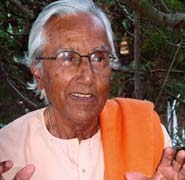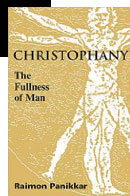

sito ufficiale


The Fullness of Man
A Christophany
In this text (which can be better understood if one has The Unknown Christ of Hinduism present as well), Panikkar sets forth a mystic and spiritual approach for us without abandoning the philosophical and anthropological focus (particularly as it centers on intercultural philosophy). Renouncing a strong theological critical valence, he again defines the understanding of Christocentrism, the true crux theologica of our time, and takes a position in relation to the so-called theology of religions. He skillfully and effectively moves in and out of many of the airtight compartments into which so much of Western philosophical and theological thought has been confined, offering us the possibility of experiencing an authentic, living quest.
The work centers precisely on a proposal to transcend traditional Christology, which has a Sitz-im-Leben located within the history of the intersection of certain cultures in the West (Christian faith, Judaism, the Greco-Roman world, the Germanic world, and finally, Islam) (Chapter I). The necessity for transcending this horizon (in continuity but with a change) in the direction of openness and an understanding lying beyond is satisfied by the Christophany, a possible new Christian path for the third millennium. In this context, there appear some obviously significant realities that must be faced: the decline of traditional religions (including the internal crisis of Christian identity), and the proliferation of new forms of religiosity all within the encounter between different cultures and religions now taking place on a planetary scale.
It is important, however, to understand the dimension of openness and intrareligious dialogue implicit in this research. The Christian experience, understood kairologically and not chronologically, cannot be exhausted by Christendom (a civilization), nor even by Christianity (a religion), but must also include the dimension of Christianness, that is, the dimension of personal religiosity based on the experience of Christ, which “adopts a behavior analogous to that of Christ.” Besides the physical eye, oculus carnis, and the mind’s eye, oculus mentis, it is necessary to open the eye of faith, oculus fidei, that is, to welcome the presence and action of the Spirit in the form of the “third eye”, beyond factual, historical evidence and beyond the methodology proper to reason which stops at evidence of intelligibility. A change in Christian self-understanding itself.
“Christophany” is a Christian word and implicitly runs through the “phaneros” of Christian scripture. It concerns a “manifestation” of Christ to human consciousness and includes both an experience of Christ and a critical reflection on that experience”. It is “overcoming of tribal and historical Christology”. Situated in the experiential plane (and not merely in the plane of a discursive theory), it deals with a faith that understands that its strength lies in radically calling into question our cosmovision.
At the center of this reflection is an original, non-spatial theologico-biblical inquiry into the personal experience of Jesus as a mystic. But the word of Panikkar and the word of Jesus subtly enrich each other. It is a mystic experience for the author and can be so for the reader as well. Through this understanding each one can realize what the Son of Man revealed to himself and calls each one to equally realize “as son of man, just as man”. In the fullness of man shines forth the Christophany.
It is well understood how much the preoccupation of theology depends on the traditional christology combined with the question of the identification of the Christ. Panikkar underscores the difference between the Christ of faith and the Jesus of history (“Jesus is Christ, but Christ cannot be identified completely with Jesus”. Surprisingly, many theologians deduce that this affirmation does not respect the central affirmation of Christian experience itself, according to which “Jesus is the Christ”. But the identity of Christ is not his identification. The understanding in the oculus fidei can be free from the strict category of the logical dialectics. Again: we cannot comprehend if we do not bring our cosmovision into discussion.
translation from Italian
